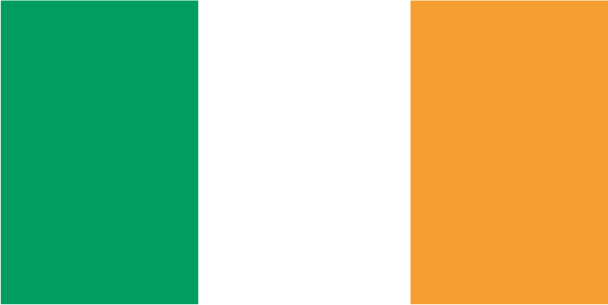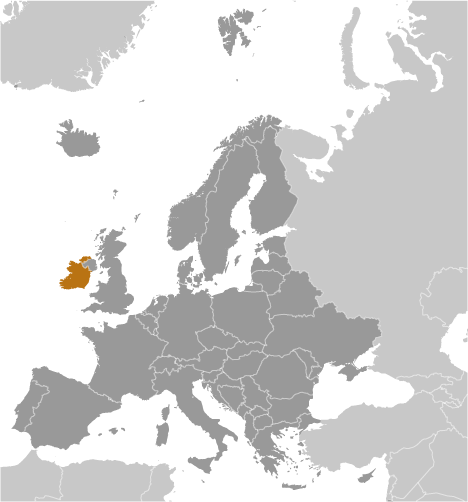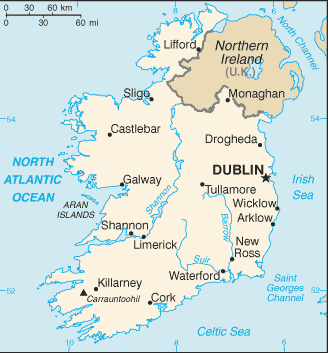Celtic tribes arrived on the island between 600-150 B.C. Invasions by Norsemen that began in the late 8th century were finally ended when King Brian BORU defeated the Danes in 1014. English invasions began in the 12th century and set off more than seven centuries of Anglo-Irish struggle marked by fierce rebellions and harsh repressions. A failed 1916 Easter Monday Rebellion touched off several years of guerrilla warfare that in 1921 resulted in independence from the UK for 26 southern counties; six northern (Ulster) counties remained part of the UK. In 1949, Ireland withdrew from the British Commonwealth; it joined the European Community in 1973. Irish governments have sought the peaceful unification of Ireland and have cooperated with Britain against terrorist groups. A peace settlement for Northern Ireland is gradually being implemented despite some difficulties. In 2006, the Irish and British governments developed and began to implement the St. Andrews Agreement, building on the Good Friday Agreement approved in 1998.
Country Name
Conventional long form:none
Conventional short form:Ireland
Local long form:none
Local short form:Eire
Government Type
republic, parliamentary democracy
Capital
Name:Dublin
Geographic coordinates:53 19 N, 6 14 W
Time difference: UTC 0 (5 hours ahead of Washington, DC during Standard Time)
daylight saving time: +1hr, begins last Sunday in March; ends last Sunday in October
Administrative divisions
29 counties and 5 cities*; Carlow, Cavan, Clare, Cork, Cork*, Donegal, Dublin*, Dun Laoghaire-Rathdown, Fingal, Galway, Galway*, Kerry, Kildare, Kilkenny, Laois, Leitrim, Limerick, Limerick*, Longford, Louth, Mayo, Meath, Monaghan, North Tipperary, Offaly, Roscommon, Sligo, South Dublin, South Tipperary, Waterford, Waterford*, Westmeath, Wexford, Wicklow
Independence
6 December 1921 (from the UK by treaty)
National Holiday
Saint Patrick's Day, 17 March
Constitution
adopted 1 July 1937 by plebiscite; effective 29 December 1937
Legal system
based on English common law substantially modified by indigenous concepts; judicial review of legislative acts in Supreme Court; has not accepted compulsory ICJ jurisdiction
Suffrage
18 years of age; universal
Executive branch
Chief of state:President Mary MCALEESE (since 11 November 1997)
Head of government:Taoiseach (Prime Minister) Brian COWEN (since 7 May 2008)
Cabinet:Cabinet appointed by the president with previous nomination by the prime minister and approval of the House of Representatives
(For more information visit the World Leaders website)
Elections:president elected by popular vote for a seven-year term (eligible for a second term); election last held on 31 October 1997 (next scheduled for October 2011); note - Mary MCALEESE was appointed to a second term when no other candidate qualified for the 2004 presidential election; prime minister (taoiseach) nominated by the House of Representatives and appointed by the president
Election results:Mary MCALEESE elected president; percent of vote - Mary MCALEESE 44.8%, Mary BANOTTI 29.6%
Legislative branch
bicameral Parliament or Oireachtas consists of the Senate or Seanad Eireann (60 seats; 49 members elected by the universities and from candidates put forward by five vocational panels, 11 are nominated by the prime minister; members serve five-year terms) and the House of Representatives or Dail Eireann (166 seats; members elected by popular vote on the basis of proportional representation to serve five-year terms)
Elections: Senate - last held in July 2007 (next to be held by July 2012); House of Representatives - last held on 24 May 2007 (next to be held by May 2012)
Election results:Senate - percent of vote by party - NA; seats by party - Fianna Fail 28, Fine Gael 14, Labor Party 6, Progressive Democrats 2, Green Party 2, Sein Fein 1, independents 7; House of Representatives - percent of vote by party - Fianna Fail 41.6%, Fine Gael 27.3%, Labor Party 10.1%, Sinn Fein 6.9%, Green Party 4.7%, Progressive Democrats 2.7%, other 6.7%; seats by party - Fianna Fail 78, Fine Gael 51, Labor Party 20, Sinn Fein 4, Green Party 6, Progressive Democrats 2, independents 4, Speaker of the Dail 1
note: on 8 November 2008, delegates voted to disband the Progressive Democrats, and in November 2009 it officially stopped operating as a political party
Judicial branch
Supreme Court (judges appointed by the president on the advice of the prime minister and cabinet)
Political Parties and Leaders
Fianna Fail [Brian COWEN]; Fine Gael [Enda KENNY]; Green Party [John GORMLEY]; Labor Party [Eamon GILMORE]; Progressive Democrats or PD [Noel GREALISH] (formerly dissolved on 20 November 2009); Sinn Fein [Gerry ADAMS]; Socialist Party [Joe HIGGINS]; The Workers' Party [Michael FINNEGAN]
Political pressure groups and leaders
Families Acting for Innocent Relatives or FAIR [Brian MCCONNELL] (seek compensation for victims of violence); Families Against Intimidation and Terror or FAIT (oppose terrorism); Gaeltacht Civil Rights Campaign (Coiste Cearta Sibhialta na Gaeilge) or CCSG (encourages the use of the Irish language and campaigns for greater civil rights in Irish speaking areas); Iona Institute [David QUINN] (a conservative Catholic think tank); Irish Anti-War Movement [Richard Boyd BARRETT] (campaigns against wars around the world); Irish Republican Army or IRA (terrorist group); Keep Ireland Open (environmental group); Midland Railway Action Group or MRAG [Willie ALLEN] (transportation promoters); Peace and Neutrality Alliance [Roger COLE] (campaigns to protect Irish neutrality); Rail Users Ireland (formerly the Platform 11 - transportation promoters); 32 Country Sovereignty Movement or 32CSM (supports a fully sovereign Ireland); Ulster Defence Association or UDA (terrorist group)
International organization participation
ADB (nonregional member), Australia Group, BIS, CE, EAPC, EBRD, EIB, EMU, ESA, EU, FAO, FATF, IAEA, IBRD, ICAO, ICC, ICCt, ICRM, IDA, IEA, IFAD, IFC, IFRCS, IHO, ILO, IMF, IMO, Interpol, IOC, IOM, IPU, ISO, ITSO, ITU, ITUC, MIGA, MINURCAT, MINURSO, MONUC, NEA, NSG, OAS (observer), OECD, OPCW, OSCE, Paris Club, PCA, PFP, UN, UNCTAD, UNESCO, UNHCR, UNIDO, UNIFIL, UNMIL, UNOCI, UNTSO, UPU, WCO, WFTU, WHO, WIPO, WMO, WTO, ZC
Diplomatic representation in the US
Chief of mission: Ambassador Michael COLLINS
Chancery:2234 Massachusetts Avenue NW, Washington, DC 20008
Telephone:[1] (202) 462-3939
FAX:[1] (202) 232-5993
Consulate(s) general:Boston, Chicago, New York, San Francisco
Diplomatic representation from the US
Chief of mission:Ambassador Daniel ROONEY
Embassy:42 Elgin Road, Ballsbridge, Dublin 4
Mailing address:use embassy street address
Telephone:[353] (1) 668-8777
FAX:[353] (1) 668-9946
Flag description
three equal vertical bands of green (hoist side), white, and orange; officially the flag colors have no meaning, but a common interpretation is that the green represents the Irish nationalist (Gaelic) tradition of Ireland; orange represents the Orange tradition (minority supporters of William of Orange); white symbolizes peace (or a lasting truce) between the green and the orange
note: similar to the flag of Cote d'Ivoire, which is shorter and has the colors reversed - orange (hoist side), white, and green; also similar to the flag of Italy, which is shorter and has colors of green (hoist side), white, and red










